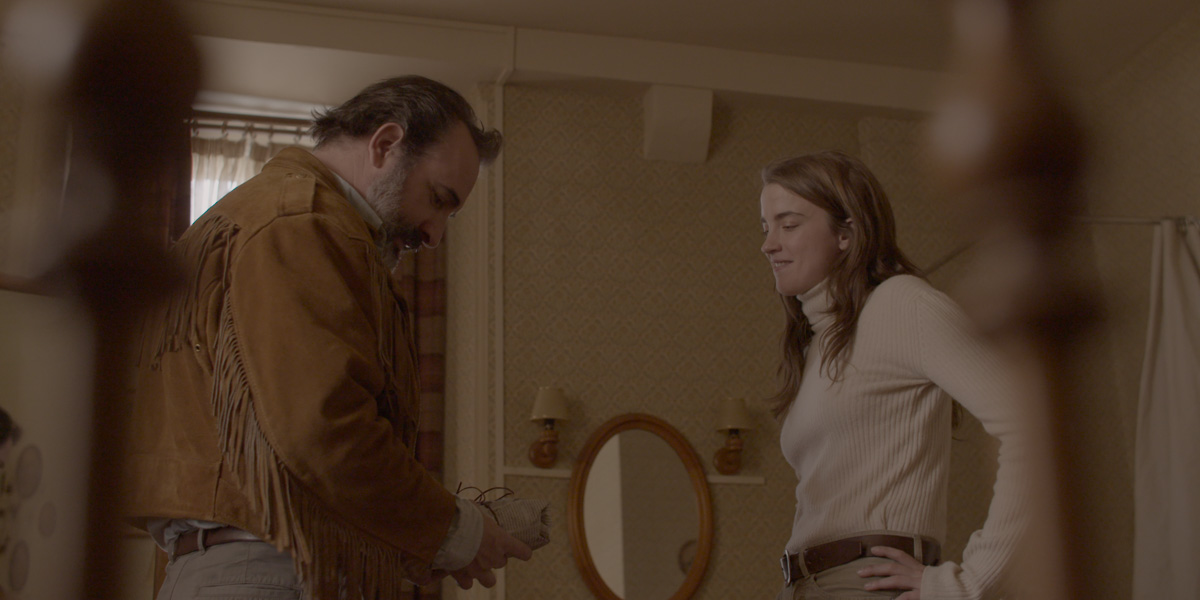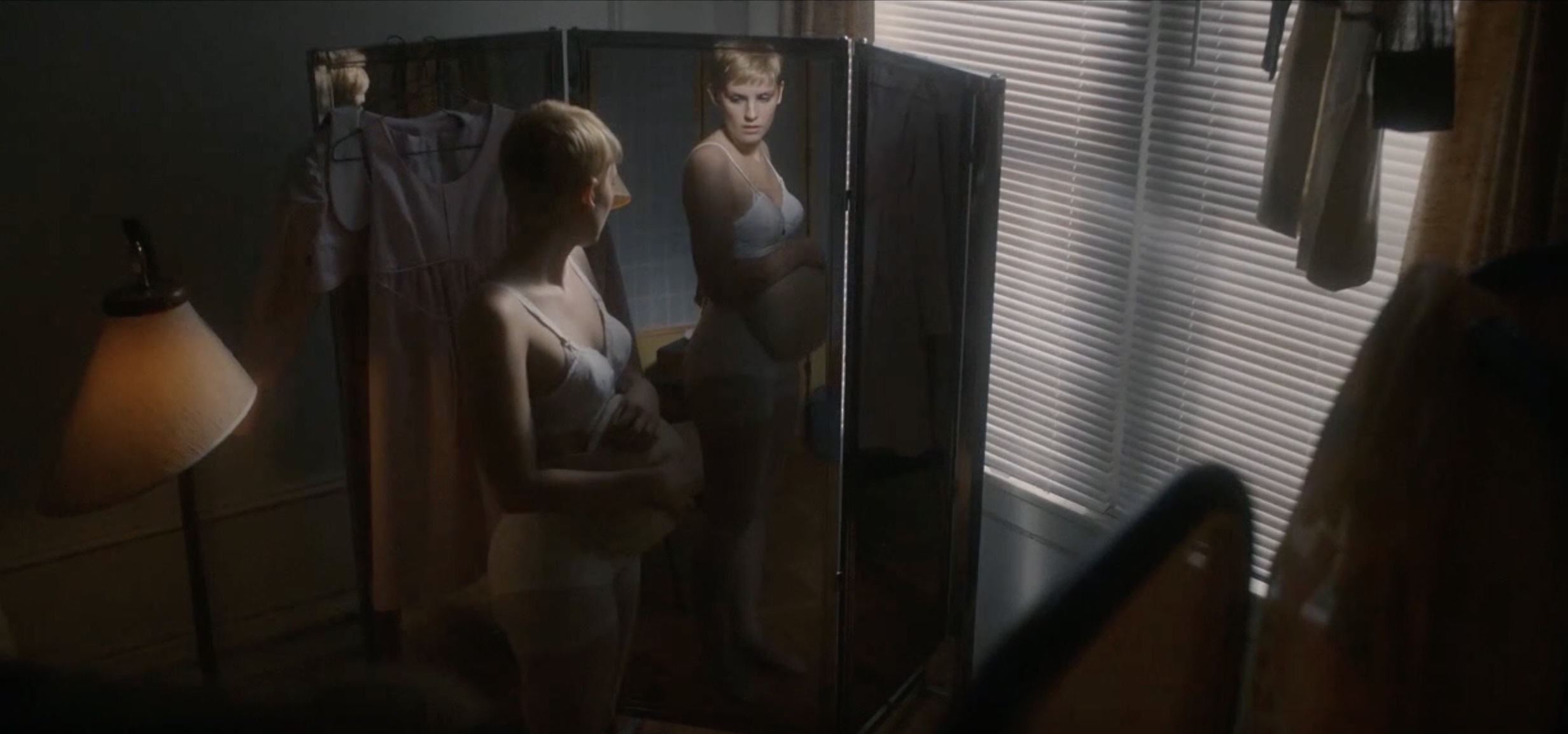Reviews
[TIFF Review] ‘Deerskin’ is an Absurd Dark Comedy About a Killer Coat!

There’s an absurdist streak running through Deerskin, the French dark comedy about a man who slowly turns homicidal under the influence of a new – you guessed it – deerskin jacket. Quentin Dupieux (Rubber)’s new film strikes a delicate tone, mashing together the portrait of a man in a mid-life crisis spiral, a gentle critique of DIY filmmaking and a hilariously off-beat slasher film.
After disposing of his cumbersome everyday jacket at a highway rest stop, Georges (The Artist’s Jean Dujardin) drives through the bucolic French countryside for a pre-arranged meeting with an elderly man selling his antique deerskin jacket. Georges’ appreciative and enthusiastic response to the fringed monstrosity is the first hint of Dupieux’s comedic script; our protagonist is so enamored with his “killer style” that he can’t stop himself from constantly admiring his reflection in car and shop windows. He’s also not afraid to raise the subject of his new jacket in conversation with whomever he meets.
The screenplay never explains what prompted Georges’ sudden odyssey, though it is evident that his marriage was in trouble (during a phone call with his unseen wife, she announces that he no longer exists to her). After maxing out his joint account in order to significantly overpay for the jacket to the tune of $7500 Euros (!), Georges may fancy himself a new fashion icon, but he has an immediate – and significant – cashflow problem.
Thankfully the seller also gifts him a camcorder, which prompts Georges to adopt the guise of filmmaker. After bluffing his way through a conversation with amateur editor Denise (Adèle Haenel), who is also the comely local bartender, Georges enlists her help with his burgeoning film project: documenting the elimination of all of the jackets in the world.

Why such a random and frankly ridiculous quest? Because the twist, so to speak, is that Georges’ deerskin jacket is actually sentient, and its greatest wish is to be the only jacket left in the world. Dupieux and Dujardin mostly play Georges’ increasingly delusional and narcissistic ruse with a straight face, which only serves to underscore the film’s absurdist approach to comedy. In one sequence, Georges tries out a variety of different voices, before settling on the one that can be heard speaking to him throughout the rest of the film.
While it is not the film’s main interest, there is a slight tease as to whether is Georges is simply going mad or if the coat actually is supernatural. At one point, the coat calls for Georges’ attention while he is reading and the camera focuses on whomever is speaking and blurs the other (the coat in the background while Georges is in the foreground). Attentive viewers will note that when the coat is supposedly speaking, Georges’ lips are visibly moving. And yet…there is another scene when the coat seemingly speaks to him while he is deep in sleep that could suggest otherwise.
Regardless of whether the deerskin jacket is alive, Dupieux’s script is principally interested in chronicling Georges’ actions as he becomes increasingly fixated on making his “art”. With virtually no funds to work with, Georges dupes Denise into believing that his producers have abandoned him while filming in Siberia so that she’ll provide him funds. He also barters his wedding ring not once, but twice, to the proprietor of the inn where he is staying (the circumstances that allow him to do so is another testament to the dark comedy streak running through the film).
There’s an undeniable critique of the lengths that are sometimes required in order to self-fund a DIY film project, particularly the way that Georges does whatever he can – lies, steals, and, yes, murders – to accomplish his goals. The fact that his lies are so bald-faced and terrible only adds to the film’s appeal.
Add to this Georges’ obsession with continually adding to his deerskin aesthetic in the form of other clothes, thereby rendering him an utterly ridiculous figure as he parades around town, dispatching people for their jackets with a make-shift machete fashioned out of a ceiling fan.
It’s insane, and yet Deerskin is so confidently directed and performed that the film completely works. This is the definition of a “not for everyone” film, as some audiences will undoubtedly yearn for more bloodshed and less comedy. For those with a taste for the absurd, however, Deerskin is an unexpected delight.

Reviews
“AHS: Delicate” Review – “Little Gold Man” Mixes Oscar Fever & Baby Fever into the Perfect Product

‘AHS: Delicate’ enters early labor with a fun, frenzied episode that finds the perfect tone and goes for broke as its water breaks.
“I’ll figure it out. Women always do.”
American Horror Story is no stranger to remixing real-life history with ludicrous, heightened Murphy-isms, whether it’s AHS: 1984’s incorporation of Richard Ramirez, AHS: Cult’s use of Valerie Solanas, or AHS: Coven’s prominent role for the Axeman of New Orleans. Accordingly, it’s very much par for the course for AHS: Delicate to riff on other pop culture touchstones and infinitely warp them to its wicked whims. That being said, it takes real guts to do a postmodern feminist version of Rosemary’s Baby and then actually put Mia Farrow – while she’s filming Rosemary’s Baby, no less – into the narrative. This is the type of gonzo bullshit that I want out of American Horror Story! Sharon Tate even shows up for a minute because why the hell not? Make no mistake, this is completely absurd, but the right kind of campy absurdity that’s consistently been in American Horror Story’s wheelhouse since its inception. It’s a wild introduction that sets up an Oscar-centric AHS: Delicate episode for success. “Little Gold Man” is a chaotic episode that’s worth its weight in gold and starts to bring this contentious season home.
It’d be one thing if “Little Gold Man” just featured a brief detour to 1967 so that this season of pregnancy horror could cross off Rosemary’s Baby from its checklist. AHS: Delicate gets more ambitious with its revisionist history and goes so far as to say that Mia Farrow and Anna Victoria Alcott are similarly plagued. “Little Gold Man” intentionally gives Frank Sinatra dialogue that’s basically verbatim from Dex Harding Sr., which indicates that this demonic curse has been ruffling Hollywood’s feathers for the better part of a century. Anna Victoria Alcott’s Oscar-nominated feature film, The Auteur, is evidently no different than Rosemary’s Baby. It’s merely Satanic forces’ latest attempt to cultivate the “perfect product.” “Little Gold Man” even implies that the only reason that Mia Farrow didn’t go on to make waves at the 1969 Academy Awards and ends up with her twisted lot in life is because she couldn’t properly commit to Siobhan’s scheme, unlike Anna.
This is easily one of American Horror Story’s more ridiculous cold opens, but there’s a lot of love for the horror genre and Hollywood that pumps through its veins. If Hollywood needs to be a part of AHS: Delicate’s story then this is actually the perfect connective tissue. On that note, Claire DeJean plays Sharon Tate in “Little Gold Man” and does fine work with the brief scene. However, it would have been a nice, subtle nod of continuity if AHS: Delicate brought back Rachel Roberts who previously portrayed Tate in AHS: Cult. “Little Gold Man” still makes its point and to echo a famous line from Jennifer Lynch’s father’s television masterpiece: “It is happening again.”
“Little Gold Man” is rich in sequences where Anna just rides the waves of success and enjoys her blossoming fame. She feels empowered and begins to finally take control of her life, rather than let it push her around and get under her skin like a gestating fetus. Anna’s success coincides with a colossal exposition dump from Tavi Gevinson’s Cora, a character who’s been absent for so long that we were all seemingly meant to forget that she was ever someone who was supposed to be significant. Cora has apparently been the one pulling many of Anna’s strings all along as she goes Single White Female, rather than Anna having a case of Repulsion. It’s an explanation that oddly works and feeds into the episode’s more general message of dreams becoming nightmares. Cora continuing to stay aligned with Dr. Hill because she has student loans is also somehow, tragically the perfect explanation for her abhorrent behavior. It’s not the most outlandish series of events in an episode that also briefly gives Anna alligator legs and makes Emma Roberts and Kim Kardashian kiss.

“Little Gold Man” often feels like it hits the fast-forward button as it delivers more answers, much in the same vein as last week’s “Ava Hestia.” These episodes are two sides of the same coin and it’s surely no coincidence that they’re both directed by Jennifer Lynch. This season has benefitted from being entirely written by Halley Feiffer – a first for the series – but it’s unfortunate that Lynch couldn’t direct every episode of AHS: Delicate instead of just four out of nine entries. That’s not to say that a version of this season that was unilaterally directed by Lynch would have been without its issues. However, it’s likely that there’d be a better sense of synergy across the season with fewer redundancies. She’s responsible for the best episodes of AHS: Delicate and it’s a disappointment that she won’t be the one who closes the season out in next week’s finale.
To this point, “Little Gold Man” utilizes immaculate pacing that helps this episode breeze by. Anna’s Oscar nomination and the awards ceremony are in the same episode, whereas it feels like “Part 1” of the season would have spaced these events out over four or five episodes. This frenzied tempo works in “Little Gold Man’s” favor as AHS: Delicate speed-runs to its finish instead of getting lost in laborious plotting and unnecessary storytelling. This is how the entire season should have been. Although it’s also worth pointing out that this is by far the shortest episode of American Horror Story to date at only 34 minutes. It’s a shame that the season’s strongest entries have also been the ones with the least amount of content. There could have been a whole other act to “Little Gold Man,” or at the least, a substantially longer cold open that got more out of its Mia Farrow mayhem.
“Little Gold Man” is an American Horror Story episode that does everything right, but is still forced to contend with three-quarters of a subpar season. “Part 2” of AHS: Delicate actually helps the season’s first five episodes shine brighter in retrospect and this will definitely be a season that benefits from one long binge that doesn’t have a six-month break in the middle. Unfortunately, anyone who’s already watched it once will likely not feel compelled to experience these labor pains a second time over. With one episode to go and Anna’s potential demon offspring ready to greet the world, AHS: Delicate is poised to deliver one hell of a finale.
Although, to paraphrase Frank Sinatra, “How do you expect to be a good conclusion if this is what you’re chasing?”















You must be logged in to post a comment.